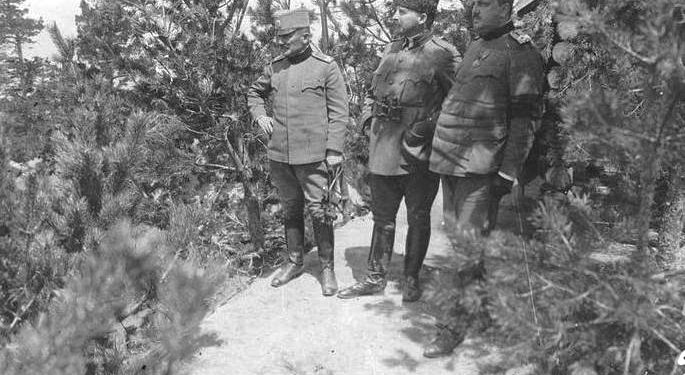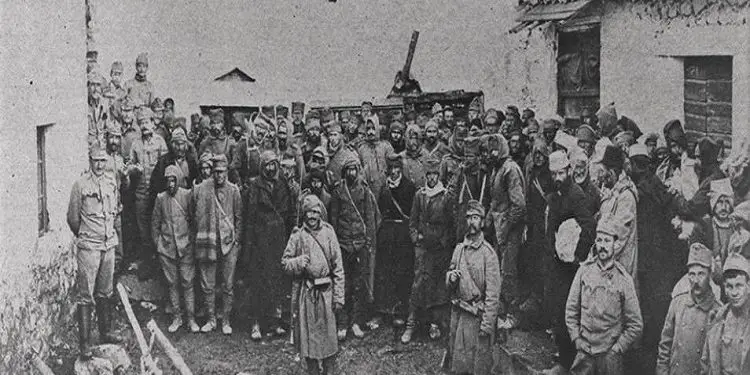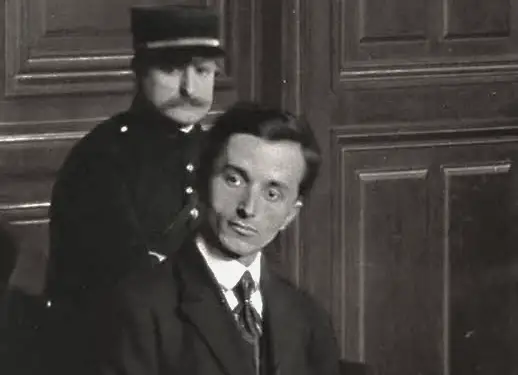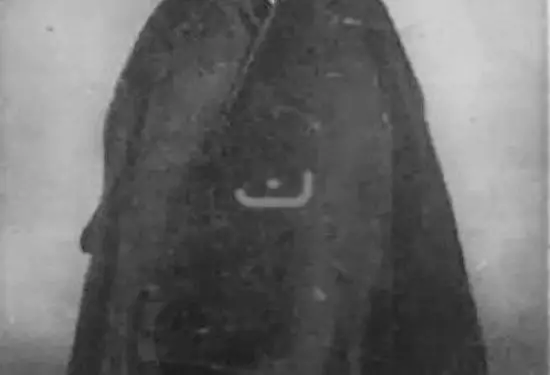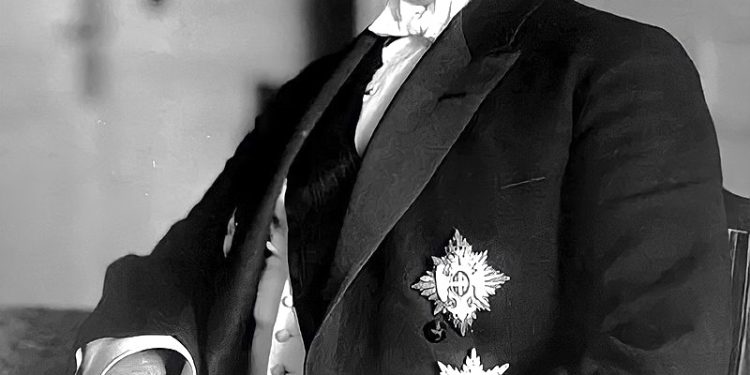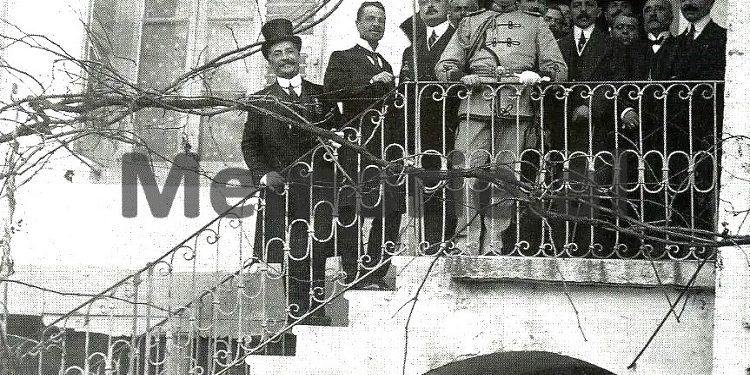By Astrit Kola
Part two
Memorie.al / Historical sources have clearly shown the close relations of Esat Pasha with Serbia, during the First World War and with the Royal Yugoslavia of Versailles, led by the same emblematic figure of Serbian-Yugoslav politics of the last two decades of the 19th century and the first quarter of the following century, Esat’s friend, Nikola Pašić, founder and chairman of the Radical Party of Serbia. These relations, only for a short time, were a partnership, mainly during the First World War, while in the rest of the time; they were vassal relations, as Esat was paid for his “services.”
Consequently, they were also relations of mutual interest, among which the most decisive was the acceptance of restrictions on Albanian administrative territories, in favor of the expansion of the territorial spaces and vital interests of Serbia and, later, of Royal Yugoslavia.
It is no coincidence that in his letter to the French Prime Minister, Millerand, Pašić describes Esat as “the chairman of the government of the Principality of Albania,” whose administrative authority extended only to Central Albania, while the annexationist demands of the Serb-Croat-Slovene Kingdom in Paris extended over all of North-Eastern Albania, affecting very few territories of Esat’s “Principality,” with its residence in Durrës.
In the archival documentation used for this dossier, the Yugoslavs openly admit the fact of the “services” that Esat had provided them, without hiding the systematic financing of him, his supporters on the ground, and even his phantom government, composed of people who acted as pages and major-domos in the suite of the renowned Pasha. The Serbs and Pašić, not for nothing, were so generous and financed Esat with staggering sums, which reached 120,000 gold francs per month.
At the meeting of the Yugoslav delegation on January 11, 1920, there was an extensive discussion about Esat Pasha, the importance of his political role for Yugoslavia in the past and in the current conditions, the political role he could play in the developments in Albania and with his presence in Paris, how the Yugoslavs would help him, etc. This is what was said at the meeting:
DISCUSSIONS AT THE MEETING OF THE YUGOSLAV DELEGATION AT THE PARIS PEACE CONFERENCE ON HOW ESAT PASHA TOPTANI WOULD BE HELPED
“Mr. Trumbić asks what we will do with Esat Pasha in the future.”
- Pašić answers that; in a way, we have all been informed about what he has done for us. When the Albanian problem is finally resolved, Esat certainly cannot return to Albania, and in that case, we must support and keep him.
- Drashković mentioned the services he has done for us; reminding us that Esat also has political ambitions. We have a duty to support him, but, above all, we must enable him to appear before the Peace Conference and speak on behalf of the Albanian people.
- Pašić emphasized that an intervention with Mr. Clemenceau (chairman of the Peace Conference) could be attempted for this purpose, but at the same time expressed doubt that this would be accepted (i.e., Esat Pasha’s appearance before the Peace Conference and speaking there on behalf of the Albanian people – translator’s note A.K.)”.
On January 11, 1920, from Belgrade, the Chairman of the Yugoslav Ministerial Council, Davidović, sent a letter to Minister Popović in Paris, in which he informed him:
“Our military commander of the Ohrid district informs us that the Committee of Esat Pasha’s supporters declared to the commander of the Dibra post that they (the members of the Committee – supporters of Esat – note by A.K.) were not being given financial aid and the necessary means.
This committee has loyal people, scattered throughout the district. In fact, the relations of the committee in question, with respect to our civilian and military authorities, are very unpleasant.
Please inform Esat Pasha about this, and ask him to influence his committee to change its attitude towards our authorities.”
(No. 1827 – Archive of former Yugoslavia, 336-27-V-VII/9-5204).
Prime Minister Pašić was informed of the situation created in Dibra between Esat’s supporters and the Serbian authorities, and due to the high sensitivity to the problems related to Esat and his supporters in Dibra, he sent a telegram, on January 12, 1920, to the Yugoslav Minister of Internal Affairs, in which he wrote:
“I received your telegram No. 1837. The Dibra Committee has not yet received orders from its chief Esat Pasha. It has not received them due to time, since you informed us only yesterday, on January 11.
On January 6, the shipment from the Ministry of Finance No. 142416 arrived, which pays Esat Pasha 120,000 francs for the month of December, but which, in fact, are for the month of November.
In addition, I am informing you that tomorrow, January 13; the delegation does not have money to pay Esat for the month of December.
However, he must send a part of this money to Thessaloniki and, from Thessaloniki; the money must be sent to his Committee in Dibra.
The payment for the month of December has not yet reached Esat. No installment payment from the amount of 500,000 francs has arrived either.
In addition, by shortening the procedures, please inform Jovanović by telegram to pay 20,000 francs to Omer (chairman of the Esadist Committee in Dibra – note by A.K.), so that he returns and goes to convince the Committee to continue the activity and actions.”
Pašić
(Archive of former Yugoslavia, 336-27-V-VII/9-5204).
On June 13, 1920, Avni Rustemi killed Esat Pasha in Paris. Unable to learn concrete facts about how Pašić experienced the loss of his personal friend, the following telegram and the interest in the financial difficulties and problems of Esat’s family, officials, and relatives who accompanied him, testify to maximum pre-disposition and the desire for help.
Immediately after Esat’s assassination, Pašić informed Belgrade by telegram, which briefly states: “This afternoon Esat Pasha was killed in front of the ‘Continental’ Hotel. He was killed by a revolver of an Arnaout from Southern Albania.”
Pašić
(Archive of former Yugoslavia, 336-27-VII-VII/9-6750)
Not even two days after Esat’s assassination, on June 15, 1920, by means of a telegram, titled “Personally for the Chairman of the Ministerial Council, Mr. Davidović,” Pašić informed him:
“The officials with Esat Pasha have been left without any material income. And this is because Esat Pasha was financially isolated and frozen by the French authorities.
Esat Pasha did not accept our help recently, for months. It is necessary and a must that we assist these officials with a sum no less than 100,000 gold francs.
Please order that this entire amount be placed at their disposal and along with it the payment of our entire debt to Esat Pasha, since we have not paid him what we owe him and because his officials have nowhere else to turn for help.
I consider this a moral obligation and a political interest.”
Pašić
(Archive of former Yugoslavia, 336-27-XI-XII/9-6446)
In response to Pašić’s telegram, Deputy Foreign Minister Ninčić, on June 17, 1920, sent the Serbian Prime Minister a top-secret telegram, in which he informed him:
“Our embassy in Paris was ordered to pay 120,000 gold francs. You can use this amount to pay off Esat Pasha’s debts.
If you need even more to pay his debts, let us know. As for Esat Pasha’s wife, the government decided to pay her, in the form of a pension, the amount of 30,000 gold francs per year, starting from June 15.”
Top secret, No. 3131.
Ninčić
(Archive of former Yugoslavia, 336-27-VI-VII/9-6492)
That same evening, at an extraordinary meeting led by Pašić, the Yugoslav delegation discussed the situation created after Esat’s assassination, but where, of course, from the content of the minutes, the most insignificant part has been revealed, specifically the one that talks about the aid requested by Esat’s family and the official response of the Yugoslav side, where it is stated:
“Mr. Pašić informed the delegation that Esat Pasha’s Minister of Foreign Affairs, Terko (Pavli Terka), and his first cousin, Xhemil Vlora, had gone to see him.
They had begged Mr. Pašić to increase the amount specified for the repayment of Esat’s debts, in order to pay off the other remaining debts, either due to losses in current accounts, or for the payment of war damages and pensions and salaries of his people.
Mr. Pašić informed the government about all this and requested additional funds.”
(B. Krizman – B. Hrabak, minutes, page 296).
In the continuation of the obligations to Esat and in response to telegram No. 3131, the day after the delegation meeting, on June 18, 1920, Pašić sent a telegram to the Chairman of the Yugoslav Ministerial Council, where he emphasized:
“Our embassy and delegation no longer have money and can no longer grant an increase to Esat Pasha’s officials and family.
Please do what you can at the Ministry of Finance.”
Pašić
(Archive of former Yugoslavia, 336-27-VI-VII/9-6492)
Immediately from Belgrade, a detailed letter was sent to Mihajlović, (the Yugoslav envoy working in Paris), in which the decisions made in Belgrade were announced, for the financial compensation, rewards, and pensioning of Esat Pasha’s family members, and where it was literally emphasized:
“According to the order of Mr. Pašić, I have the honor to inform you that it was ordered to bring and pay the money from the amount sent at the disposal of our embassy, sent to the address of Mr. Esat Pasha’s family and officials.
- 15,000 francs should be given from the amount allocated as an annual pension for the family of the late Esat Pasha, an amount allocated for the second half of this year, which represents half of the annual pension that the government has allocated for the family of the deceased.
- Terko (Pavli Terka), the Minister of Foreign Affairs with Mr. Esat Pasha, should be given the amount of 10,000 gold francs, allocated to him by the Royal Yugoslav government as annual aid.
- Stavri should be given the amount of 10,000 gold francs and it should be made clear to him that this amount can be increased if he wishes it at once, as long as he does not agree to receive a monthly pension, allocated by the Royal Government.
- Terko (Terka) presented the proposal to Mr. Pašić for the payment of a reward for the officials who worked with the late Esat Pasha.
Ask Mr. Stavri for a written copy of this proposal and, after you secure this copy, give him half of the amount that Mr. Terko (Terka) requested for him. Pay him for 3-4 months, in order for him to be calmed down…”.
(Archive of former Yugoslavia, 336-27-VI-VII/9-6720).
But not even ten days after Esat’s death, an alarm broke out in Belgrade about the fate of the metal chest, where the Pasha kept his secret archive with valuable documents and correspondence.
The panic of the Serbs and the immediate seizure of this chest are also mentioned in the top-secret telegram dated June 23, 1920, addressed to Pašić from Belgrade, where, among other things, it was written in a commanding tone:
“Esat Pasha had, among other things, a metal chest, in which he kept his trusted and secret archive and for this, he also had our understanding and consent.
In case Esat Pasha did not give this chest for safekeeping to our embassy, you must go immediately to his personal bodyguard, a young man named Pashk, before it’s too late.
Under no circumstances should this chest remain in the hands of Esat’s Minister of Foreign Affairs (Terka), because this would be discrediting for us.” / Memorie.al
Top secret, No. 3173.
Ninčić
(Archive of former Yugoslavia, 336-27-VI-VII/9-6357).




